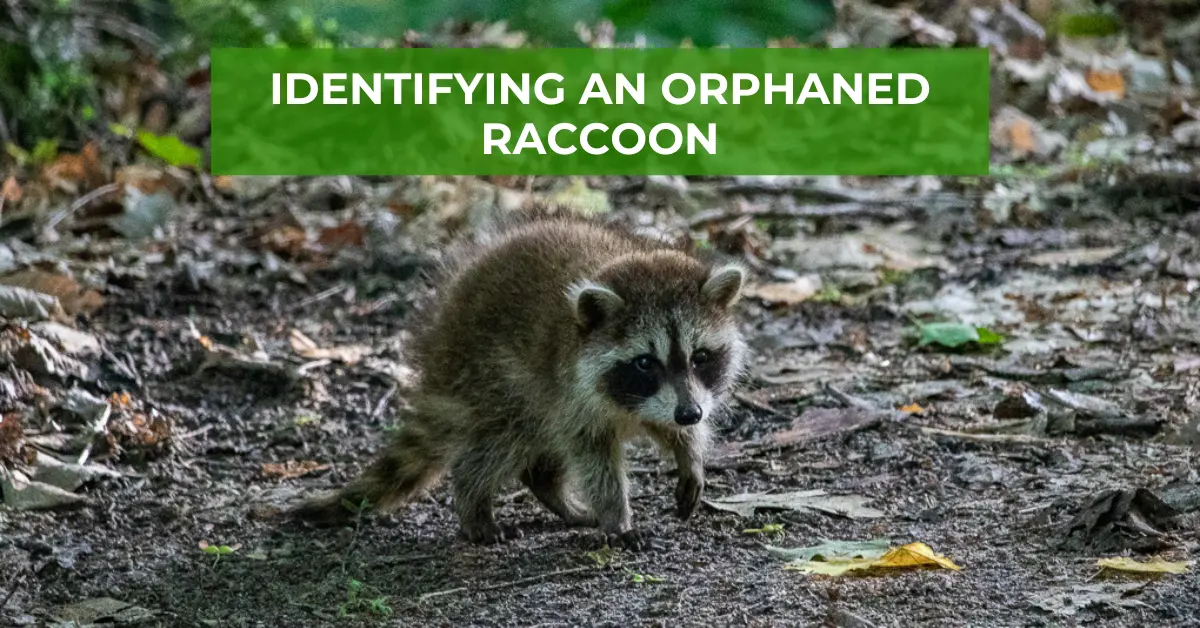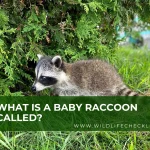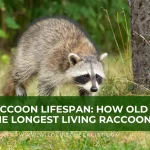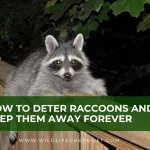How To Easily Identify An Orphaned Raccoon

How can you tell if a baby raccoon is orphaned? The answer to this question will help you save from different raccoon risks. During the spring, nature unfolds as mother raccoons are ushered into the season of giving birth to many mammal species. This timing allows the young ones to thrive in favourable weather conditions and gain independence before the onset of winter.
It is also the season when you might encounter wildlife babies that seem to be on their own. When it comes to handling adult wildlife like squirrels, raccoons, or skunks, seeking professional assistance is always essential.
As for baby raccoons, it is advisable to refrain from touching or disturbing them until you’re certain they’re orphaned. Wildlife experts advise leaving babies undisturbed unless you have strong evidence of abandonment or injury.
Contents
Signs That a Baby Raccoon is Orphaned
How can you tell if a baby raccoon is orphaned? First, it’s crucial to ascertain whether you’re indeed dealing with a baby raccoon. Newborns and those under two to three weeks will exhibit the classic raccoon mask and striped tails, but their fur may be quite sparse. As the baby raccoon grows, it will start resembling an adult raccoon with the familiar markings.
If the raccoon is approximately the size of a house cat, it’s likely old enough to fend for itself. Adult raccoons encountered in natural habitats should be left undisturbed. Mother raccoons often leave their offspring alone while they search for food. At times, mothers may relocate their babies to different spots. During these periods, raccoon babies tend to explore their surroundings in their mother’s absence.
Unfortunately, these curious babies can easily become separated from their nest. However, it’s important to note that orphaning is rare unless the mother raccoon is killed or relocated. Mother raccoons are highly protective and will go to great lengths to locate their offspring.
When it comes to relocating adult raccoons, particularly during the spring when babies are present, it’s best to leave it to the experts. Wildlife removal specialists take care to safely remove the babies from a property. They place them as close to their den as possible, and allow the mother to relocate the entire family together.
This approach minimizes the risk of the mother causing further damage while searching for her babies. If you happen to encounter a baby raccoon, keep an eye out for these signs that it might be orphaned:
- The baby raccoon seems to be injured.
- It cries persistently. While some crying is normal, if the baby doesn’t stop, it could indicate distress.
- The baby raccoon appears to be cold, dehydrated, or sick.
- You notice insects, flies, fleas, or ants on the baby raccoon.
Teach your children the importance of leaving wildlife undisturbed, even if it seems to be in trouble. A baby raccoon might have hidden injuries or carry diseases. Regardless of the wildlife you come across in your yard, it is safer to contact a professional wildlife removal company than to risk yourself of getting hurt.
What Happens to Baby Raccoons Without a Mother?
Raccoons are known to be solitary creatures, but during their infancy and up until they reach one year of age, they stick together with their siblings and mother. A litter can range from two to six babies, and the gestation period lasts approximately 65 days.
If raccoons are younger than one year old and their mother is absent, they won’t survive without her. However, this doesn’t mean you should immediately intervene to rescue them.
At times, the mother raccoon may need to leave her babies to search for food, and she can be away for several hours up to a day. Nonetheless, she always returns because she knows where she left her offspring. If she fails to return, she may be injured or deceased, making it impossible for her to reunite with her babies.
As established raccoons stick together, but they become somewhat fearful when they sense danger, seeking shelter as a protective measure. However, with increasing development encroaching upon their habitat, they may face precarious situations.
If you are able tell that a baby raccoon is orphaned or you found lone raccoon babies, just place them in a cardboard box at the location where you found them to prevent their escape until the mother retrieves them. If the mother fails to return within a day to claim her babies, it’s generally safe to assume she won’t return at all, and the best course of action is to contact a wildlife rescuer.
Can Orphaned Raccoons Survive?
In some animal species, offspring remain with their mothers for extended periods, but raccoons don’t have 30-year-old children hanging around their homes, consuming all their resources. Typically, young raccoons become independent within the first year of life. However, before venturing into the world on their own, there’s a lot for them to discover and master in their ever-changing surroundings.
Baby raccoons rely heavily on their mothers for sustenance, warmth, and security. If you encounter a baby raccoon separated from its mother, it’s best to seek professional assistance promptly.
It’s essential to understand that attempting to adopt a baby raccoon or bring it indoors is not advisable. These animals cannot thrive on human food alone, and the environment within a household—filled with noise, children, and pets—can prove overwhelming and distressing for them to handle.
How to Raise a Single Raccoon
If you’re struggling to find a companion for a raccoon, don’t lose hope. Even older raccoons are usually known to accept new young ones, making it easy to find suitable buddies for them. Late summer or early fall is the ideal time to release hand-raised raccoons, ideally in small groups resembling a family unit, typically consisting of 3 to 6 animals. This setup allows them to huddle together for warmth during their first winter.
While you’re on the lookout for raccoon companions, it’s crucial to raise a baby raccoon that is orphaned with the same care and attention you would provide to a group of orphans. This ensures the orphan develops a healthy fear of pets, especially dogs, and other humans, which is vital for its survival once released back into the wild.
On the other hand, a lone orphan raccoon will form a strong bond with you as its surrogate mother. Like other mammals, a baby raccoon’s emotional well-being hinges on feeling secure and loved. Therefore, it’s important to regularly handle, cuddle, and play with the orphan to provide the comfort and tactile stimulation it would typically receive from its mother and siblings.
However, caring for a single baby raccoon can be demanding. They dislike being alone and will cry frequently if left by themselves. In the wild, they would spend their first year constantly surrounded by their mother and siblings. Yet, it’s crucial to remember that if the baby raccoon scratches or bites someone, it could face dire consequences.
Therefore, it’s best to keep it safely confined in a room away from busy human activity, except for the times when you interact with it. Avoid treating it like a pet by allowing it to free roam inside the house or exposing it to other people or pets it should fear, such as dogs, as this could lead to trouble once it’s released back into the wild.
What You Can do if You Have an Orphaned Baby Raccoon
If you are able to tell that a baby raccoon is orphaned, and you come across one, the best course of action is to wait and observe if the mother returns. Since raccoons are nocturnal creatures, you might need to wait until nighttime to see if the mother retrieves her babies. To increase the likelihood of a reunion, it’s essential to keep your pets and children away from the baby raccoon.
Normally, baby raccoons don’t stray far from their nest on their own. So it’s reasonable to anticipate the mother’s return when she feels safe. A mother raccoon’s instinct to care for her young is robust. However, if the babies haven’t been taken by morning, they’ve probably been abandoned. In such cases, it’s advisable to contact a licensed wildlife rehabilitation centre or a wildlife removal service for assistance.
Despite their small size and potential weakness, baby raccoons can still carry diseases like rabies. They may also bite and scratch, posing a risk of injury. It’s important to remember that you should not raise raccoons as pets, and in many places, it’s illegal to do so. Seek guidance from the wildlife removal company on the appropriate steps to take.




